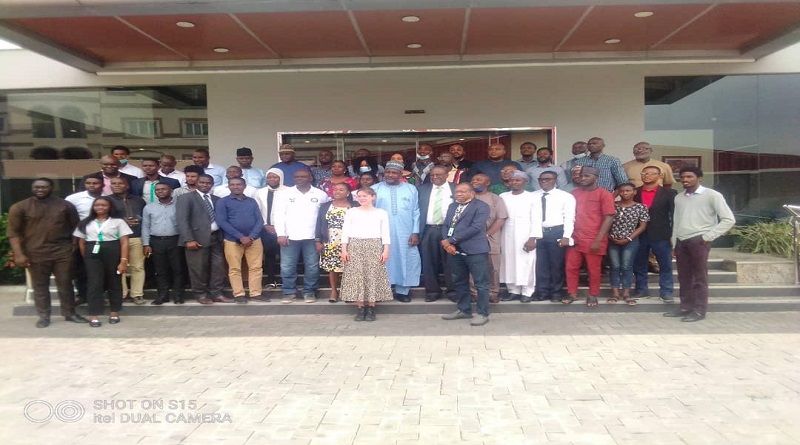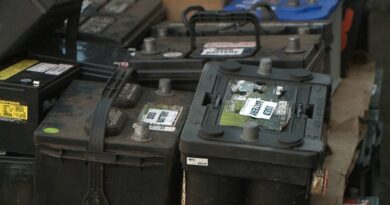Stakeholders want legislation, policies to strengthen Producers Responsibility on E-waste
Stakeholders in the e-waste sector have stressed the need for the creation of legislation and policies that will strengthen Producers Responsibility Organisations (PRO) to enable organizations to take responsibility for the cradle to grave of their products.
Besides, it will ensure that producers and manufacturers adopt the Extended Producers Responsibility strategy in their operations.
Participants including representative of government’s ministries and agencies, non-governmental organisations, academia, recyclers among others at the second stakeholder’s workshop held in Lagos on Tuesday 29 March 2022 with the theme “E-waste Compensation as an International Financing Mechanism in Nigeria (EcoN)” want aroganisations to adopt the EPR strategy in their operations.
The workshop was convened by Sustainable Research and Action for Environmental Development (SRADev Nigeria) under the auspices of the EcoN project team and being funded by the German PREVENT Waste Alliance and jointly implemented by Oeko-Institut e.V. (Germany), Closing the Loop (Netherlands), SRADev (Nigeria), Hinckley Group (Nigeria) and Verde Impacto (Nigeria).
The EcoN project aims to expand a business model known as ‘waste compensation’ to Li-ion batteries and flat panel displays allowing the support of environmentally-friendly collection and treatment in Nigeria and beyond. It also aims at effective pilot and demonstration of the mechanisms for batteries and monitors that could be scaled up as a funding mechanism in many other countries and can be used as a blueprint for developing local policies and financing instruments in Nigeria.
Executive Director, SRADev Nigeria Dr. Leslie Adogame while speaking at the stakeholder’s event suggested the need to bring in Independent partners into the management process of PRO organisations to ensure transparency.
He went further, “In as much as the PRO is set up by producers to regulate themselves, to check themselves, to ensure that they have a cradle to grave approach in waste management, some level of transparency has to be put in place and what i mean is for a society to believe in the transparency of a PRO Organisation, then there is need to be an independent source of funding you cannot self-fund and regulate yourself at the same time. What i think should be done is in the PRO process if you want to guarantee transparency, it is important to put independent partners into the process of management,” Adogame said.
Reiterating the importance of the PROs are towards ensuring that producers strictly adhere to the extended producer responsibility program, Adogame said that the PROs’ are currently being run as part of producers’ CSRs.
The SRADev chief emphasised the need to have PROs that are not dependent on the management system. “If it is possible to have PROs that are not totally dependent on the management system; the producers can pay for managing the waste but in the executive management of the PRO process needs to be independent. In other words administrative funding source to manage the administrative setting of the PRO needs to be independent,” he added.
Head of hazardous waste management, Department of Pollution Control, Federal Ministry of Environment, Amuda Oyewole, an engineer, emphasised the need for the creation of policies to back effective e-waste management in Nigeria.
Despite noting that there are regulations backing Extended Producer responsibility, he lamented that at the moment the country is without a policy backing EPR.
He also suggested that PROs approach the government for funds to liberate them from being under the influence of the producers who are mostly after making profit over the safety of lives and properties.
Distinguished Professor of Chemistry, Babajide Alo, faulted the current structure of the PROs, he explained that the current structure of the PROs does not permit them to take regulatory actions against erring producing and manufacturing organisations.
“The PROs with the way they are presently constituted will not be able to bite will not be able to give us the result that we want basically because they are funded by the producers themselves, those who supposed to regulate to take action, so one is suggesting that we need to go beyond that, we need to reconstitute it to empower them, we need to build their capacity.
“Right now it is a voluntary organisation in which those who are interested come together and say let us do something but they are not putting their money where their mouth is, they say it by word of mouth that let us come together and improve e-waste management but they are not supporting it the way it is, purely because it is still voluntary, they see it more as a CSR and you know CSR issues are issues in which they do it when they can, when they can afford it so what we are pushing for now is a manner in which we can make it compulsory where it will go away from being voluntary to being a compulsory responsibility on the side of the producers and even have an act or some regulations mandating a compulsory EPR for each of the producers, we’ll then be in the position which we’ll make them do what we want them to do,” he added.
He further disclosed that efforts are ongoing to put legislation in place to ensure that producers have a responsibility for a cradle to grave on every one of their products.




